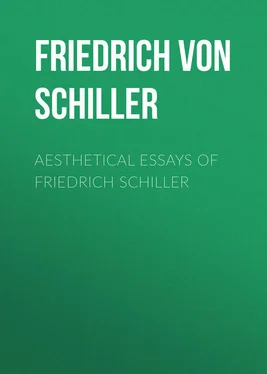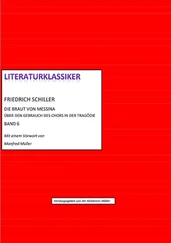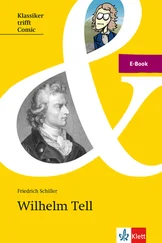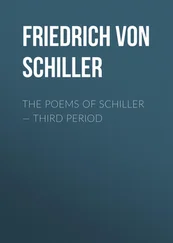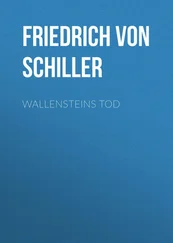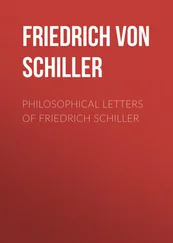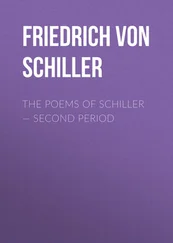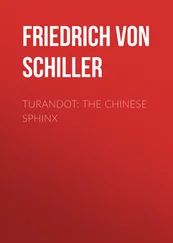Friedrich Schiller - Aesthetical Essays of Friedrich Schiller
Здесь есть возможность читать онлайн «Friedrich Schiller - Aesthetical Essays of Friedrich Schiller» — ознакомительный отрывок электронной книги совершенно бесплатно, а после прочтения отрывка купить полную версию. В некоторых случаях можно слушать аудио, скачать через торрент в формате fb2 и присутствует краткое содержание. Жанр: literature_18, foreign_antique, foreign_prose, на английском языке. Описание произведения, (предисловие) а так же отзывы посетителей доступны на портале библиотеки ЛибКат.
- Название:Aesthetical Essays of Friedrich Schiller
- Автор:
- Жанр:
- Год:неизвестен
- ISBN:нет данных
- Рейтинг книги:3 / 5. Голосов: 1
-
Избранное:Добавить в избранное
- Отзывы:
-
Ваша оценка:
- 60
- 1
- 2
- 3
- 4
- 5
Aesthetical Essays of Friedrich Schiller: краткое содержание, описание и аннотация
Предлагаем к чтению аннотацию, описание, краткое содержание или предисловие (зависит от того, что написал сам автор книги «Aesthetical Essays of Friedrich Schiller»). Если вы не нашли необходимую информацию о книге — напишите в комментариях, мы постараемся отыскать её.
Aesthetical Essays of Friedrich Schiller — читать онлайн ознакомительный отрывок
Ниже представлен текст книги, разбитый по страницам. Система сохранения места последней прочитанной страницы, позволяет с удобством читать онлайн бесплатно книгу «Aesthetical Essays of Friedrich Schiller», без необходимости каждый раз заново искать на чём Вы остановились. Поставьте закладку, и сможете в любой момент перейти на страницу, на которой закончили чтение.
Интервал:
Закладка:
Only inasmuch as life is formed in the understanding and form in feeling does life win a form and form win life, and only thus does beauty arise. By beauty the sensuous man is led up to reason, the one-sided tension of special force is strung to harmony, and man made a complete whole.
Schiller adds that beauty knits together thought and feeling; the fullest unity of spirit and matter. Its freedom is not lack, but harmony, of laws; its conditions are not exclusions, inclusion of all infinity determined in itself. A true work of art generates lofty serenity and freedom of mind. Thus the aesthetic disposition bestows on us the highest of all gifts, that of a disposition to humanity, and we may call beauty our second creator.
In these letters Schiller spoke out the mildest and highest sentiments on art, and in his paper on Simple and Sentimental Poetry (1795) he constructs the ideal of the perfect poet. This is by far the most fruitful of Schiller's essays in its results. It has much that is practically applicable, and contains a very able estimate of German poetry. The writing is also very pointed and telling, because it is based upon actual perceptions, and it is interesting because the contrast drawn out throughout it between the simple and the sentimental has been referred to his own contrast with Goethe. He also wished to vindicate modern poetry, which Goethe seemed to wish to sacrifice to the antique.
The sentimental poetry is the fruit of quiet and retirement; simple poetry the child of life. One is a favor of nature; the sentimental depends on itself, the simple on the world of experience. The sentimental is in danger of extending the limits of human nature too far, of being too ideal, too mystical. Neither character exhausts the ideal of humanity, but the intimate union of both. Both are founded in human nature; the contradictions lying at their basis, when cleared in thought from the poetical faculty, are realism and idealism. These also are sides of human nature, which, when unconnected, bring forth disastrous results. Their opposition is as old as the beginning of culture, and till its end can hardly be set aside, save in the individual. The idealist is a nobler but a far less perfect being; the realist appears far less noble, but is more perfect, for the noble lies in the proof of a great capacity, but the perfect in the general attitude of the whole and in the real facts.
On the whole it may be said, taking a survey of these labors, that if Schiller had developed his ideas systematically and the unity of his intuition of the world, which were present in his feelings, and if he had based them scientifically, a new epoch in philosophy might have been anticipated. For he had obtained a view of such a future field of thought with the deep clairvoyance of his genius.
A few words may be desirable on Schiller's religious standpoint, especially in connection with his philosophical letters.
Schiller came up ten years later than Goethe, and concluded the cyclus of genius that Goethe had inaugurated. But as he was the last arrival of that productive period of tempestuous agitation, he retained more of its elements in his later life and poetry than any others who had passed through earlier agitations, such as Goethe. For Goethe cast himself free in a great measure from the early intoxication of his youthful imagination, devoting himself partly to nobler matter and partly to purer forms.
Schiller derived from the stormy times of his youth his direction to the ideal, to the hostility against the narrow spirit of civil relations, and to all given conditions of society in general. He derived from it his disposition, not to let himself be moulded by matter, but to place his own creative and determining impress on matter, not so much to grasp reality poetically and represent it poetically as to cast ideas into reality, a disposition for lively representation and strong oratorical coloring. All this he derived from the genial period, though later on somewhat modified, and carried it over into his whole life and poetry; and for this very reason he is not only together with Goethe, but before Goethe, the favorite poet of the nation, and especially with that part of the nation which sympathizes with him in the choice of poetic material and in his mode of feeling.
Gervinus remarks that Schiller had at Weimar long fallen off from Christianity, and occupied his mind tranquilly for a time with the views of Spinoza (realistic pantheism). Like Herder and Goethe, he viewed life in its great entirety and sacrificed the individual to the species. Accordingly, through the gods of Greece, he fell out with strict, orthodox Christians.
But Schiller had deeply religious and even Christian elements, as became a German and a Kantian. He receives the Godhead in His will, and He descends from His throne, He dwells in his soul; the poet sees divine revelations, and as a seer announces them to man. He is a moral educator of his people, who utters the tones of life in his poetry from youth upwards. Philosophy was not disclosed to Plato in the highest and purest thought, nor is poetry to Schiller merely an artificial edifice in the harmony of speech; philosophy and poetry are to both a vibration of love in the soul upwards to God, a liberation from the bonds of sense, a purification of man, a moral art. On this reposes the religious consecration of the Platonic spirit and of that of Schiller.
Issuing from the philosophical school of Kant, and imbued with the antagonism of the age against constituted authorities, it is natural that Schiller should be a rationalist in his religious views. It has been justly said of him that while Goethe's system was an apotheosis of nature Schiller's was an apotheosis of man.
Historically he was not prepared enough to test and search the question of evidence as applied to divine things handed down by testimony, and his Kantian coloring naturally disposed him to include all religions within the limits of pure reason, and to seek it rather in the subject than in anything objective.
In conclusion, we may attempt to classify and give Schiller his place in the progress of the world's literary history. Progress is no doubt a law of the individual, of nations, and of the whole race. To grow in perfection, to exist in some sort at a higher degree, is the task imposed by God on man, the continuation of the very work of God, the complement of creation. But this moral growth, this need of increase, may, like all the forces of nature, yield to a greater force; it is an impulsion rather than a necessity; it solicits and does not constrain. A thousand obstacles stay its development in individuals and in societies; moral liberty may retard or accelerate its effects. Progress is therefore a law which cannot be abrogated, but which is not invariably obeyed.
Nevertheless, in proportion to the increase of the mass of individuals, the caprices of chance and of liberty neutralize each other to allow the providential action that presides over our destinies to prevail. Looking at the same total of the life of the world, humanity undoubtedly advances: there are in our time fewer moral miseries, fewer physical miseries, than were known in the past.
Consequently art and literature, which express the different states of society, must share in some degree in this progressive march. But there are two things in literary work: on the one hand the ideas and social manners which it expresses, on the other the intelligence, the feeling, the imagination of the writer who becomes its interpreter. While the former of these elements tends incessantly to a greater perfection, the latter is subject to all the hazards of individual genius. Accordingly the progressive literature is only in the inspiration, and so to speak in the matter; it may and must therefore not be continuous in form.
But more than this: in very advanced societies the very grandeur of ideas, the abundance of models, the satiety of the public render the task of the artist more and more difficult. The artist himself has no longer the enthusiasm of the first ages, the youth of imagination and of the heart; he is an old man whose riches have increased, but who enjoys his wealth less.
Читать дальшеИнтервал:
Закладка:
Похожие книги на «Aesthetical Essays of Friedrich Schiller»
Представляем Вашему вниманию похожие книги на «Aesthetical Essays of Friedrich Schiller» списком для выбора. Мы отобрали схожую по названию и смыслу литературу в надежде предоставить читателям больше вариантов отыскать новые, интересные, ещё непрочитанные произведения.
Обсуждение, отзывы о книге «Aesthetical Essays of Friedrich Schiller» и просто собственные мнения читателей. Оставьте ваши комментарии, напишите, что Вы думаете о произведении, его смысле или главных героях. Укажите что конкретно понравилось, а что нет, и почему Вы так считаете.
